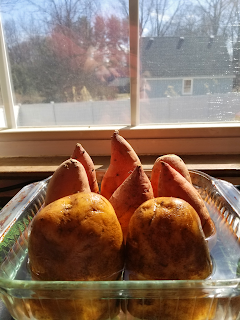Propagating Perfect Potato Slips
A short post today on the start of the potato growing
season. We started our potato slips this past weekend. There are just a few
things about doing this that are easy to do but important, so if you’re
considering growing your own spuds, and I suggest you do, read on.
Always choose organic tubers for slip-making. You not only
want to start right, with the freshest and purest potatoes you can find, but
potatoes that have been sprayed with growth inhibitors and pesticides will likely
not sprout. I tried this experiment last season, and it proved out: the organic
potatoes produced thick, healthy green slips, while the non-organic potatoes
rotted in the water. And let me tell you, that water was foul.
Use a waterproof heating mat under the potatoes to keep the
water warm, and run it 24/7. This is especially important if you are, like us,
cultivating sweet potato slips. In fact, sweet potatoes are not actually
potatoes. They are a member of the belladonna family, and hence, need plenty of
warmth to thrive.
We started organic garnet yam and russet potato slips this
weekend. We’re germinating them in the same tray at the warmest temperatures
the heat mat and a plastic dome will provide. The russets will benefit from the
extra warmth that we’re providing for the garnet yams.
Use distilled water for this venture. City water has been
poisoned with harmful chemicals, and well water is loaded with impurities and
pathogens. Both will inhibit slip growth. We use our own homemade distilled
water, but if you don’t have a distillation system at home, just pick up a
couple of gallon jugs of it at the market.
Do your slip propagation in a sunny window in your home.
Slips start photosynthesizing the moment they emerge and need sunlight to
thrive. Too little sun will produce weak, yellowed slips.
Aphids may come along while your slips are growing. They’re
nasty and destructive, so when they first appear, get rid of them fast. Rinse
the potatoes with their slips under lukewarm water until the aphids are gone. Use
your fingers gently to help dislodge the aphids. Act quickly: a serious
infestation will mean that you have to toss your slips. Put them in the
garbage, not your compost pile.
Change the rooting water often. Several days a week is
ideal. Rooting water gets cloudy and goes foul quickly. You want fresh water
for your emerging slips. This will ensure the healthiest, biggest slips
possible. Also, dirty, fouled water is just gross.
So that’s it. Warmth, sun, clean distilled water, and
organic potatoes are all you need to grow your own fresh, organic slips. For a
tutorial on how to start potato slips, check out my post from last spring, or
go to You Tube.
I’ll post a pic of our new slips in about a month or so.
Barbie xo


